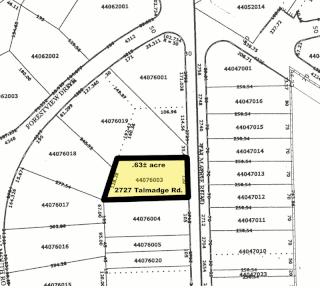Related Research Articles
Railbanking is the act of preserving railroad rights-of-way for possible future use. Railbanking leaves the rail corridor, railbed, bridges or bridge right-of-way, and other infrastructure intact. This relieves the railroad's operator from the responsibility of maintenance, and from taxation. Existing rails may or may not be maintained intact on the railbed, depending on their condition or any planned interim use of the railbed. Often the rail corridor is put in custody of a state transportation agency, which then seeks a new operator for possible rehabilitation or reactivation. This helps ensure the possibility of future restored rail service when new economic conditions may warrant resuming operation.
In United States constitutional law, a regulatory taking occurs when governmental regulations limit the use of private property to such a degree that the landowner is effectively deprived of all economically reasonable use or value of their property. Under the Fifth Amendment to the United States Constitution governments are required to pay just compensation for such takings. The amendment is incorporated to the states via the Due Process Clause of the Fourteenth Amendment.
Eminent domain, land acquisition, compulsory purchase, resumption, resumption/compulsory acquisition, or expropriation is the power of a state, provincial, or national government to take private property for public use. It does not include the power to take and transfer ownership of private property from one property owner to another private property owner without a valid public purpose. This power can be legislatively delegated by the state to municipalities, government subdivisions, or even to private persons or corporations, when they are authorized by the legislature to exercise the functions of public character.

The freedom to roam, or "everyman's right", is the general public's right to access certain public or privately owned land, lakes, and rivers for recreation and exercise. The right is sometimes called the right of public access to the wilderness or the "right to roam".
Vehicle insurance is insurance for cars, trucks, motorcycles, and other road vehicles. Its primary use is to provide financial protection against physical damage or bodily injury resulting from traffic collisions and against liability that could also arise from incidents in a vehicle. Vehicle insurance may additionally offer financial protection against theft of the vehicle, and against damage to the vehicle sustained from events other than traffic collisions, such as keying, weather or natural disasters, and damage sustained by colliding with stationary objects. The specific terms of vehicle insurance vary with legal regulations in each region.

In the United States, a plat (plan) is a cadastral map, drawn to scale, showing the divisions of a piece of land. United States General Land Office surveyors drafted township plats of Public Lands Surveys to show the distance and bearing between section corners, sometimes including topographic or vegetation information. City, town or village plats show subdivisions broken into blocks with streets and alleys. Further refinement often splits blocks into individual lots, usually for the purpose of selling the described lots; this has become known as subdivision.
A partition is a term used in the law of real property to describe an act, by a court order or otherwise, to divide up a concurrent estate into separate portions representing the proportionate interests of the owners of property. It is sometimes described as a forced sale. Under the common law, any owner of property who owns an undivided concurrent interest in land can seek such a division. In some cases, the parties agree to a specific division of the land; if they are unable to do so, the court will determine an appropriate division. A sole owner, or several owners, of a piece of land may partition their land by entering a deed poll.
In tort common law, the defense of necessity gives the state or an individual a privilege to take or use the property of another. A defendant typically invokes the defense of necessity only against the intentional torts of trespass to chattels, trespass to land, or conversion. The Latin phrase from common law is necessitas inducit privilegium quod jura privata. A court will grant this privilege to a trespasser when the risk of harm to an individual or society is apparently and reasonably greater than the harm to the property. Unlike the privilege of self-defense, those who are harmed by individuals invoking the necessity privilege are usually free from any wrongdoing. Generally, an individual invoking this privilege is obligated to pay any actual damages caused in the use of the property but not punitive or nominal damages.

Bava Kamma is the first of a series of three Talmudic tractates in the order Nezikin ("Damages") that deal with civil matters such as damages and torts. The other two of these tractates are Bava Metzia and Bava Batra : originally all three formed a single tractate called Nezikin, each "Bava" meaning "part" or "subdivision." Bava Kamma discusses various forms of damage and the compensation owed for them.

An adequate remedy or adequate remedy at law is part of a legal remedy which the court deems satisfactory, without recourse to an equitable remedy This consideration expresses to the court whether money should be awarded or a court order should be decreed.. Adequate remedy at law refers to the sufficient compensation for the loss or damages caused by the defendant with a proper monetary award. The court must grant the adequacy of remedy that will lead to a "meaningful hearing". Whether legal damages or equitable relief are requested depends largely on,whether or not the remedy can be valued. Both two elements, compensation and the meaningfulness of hearing, provide a proper way to have an adequate remedy. The word "meaningfulness" of hearing in the law process is the assumption that the defendant compensated must be meaningful for the injured party where the defendant made a fully covered compensation for all the losses. Hence, the hearing in which cannot give any right amount of compensation award or settlement is not "meaningful", and the unavailability of the compensation will lead to an inadequate remedy. The adequate remedy at law is the legal remedies by meaning it is satisfactory compensation by way of monetary damages without granting equitable remedies.
Pennsylvania Coal Co. v. Mahon, 260 U.S. 393 (1922), was a case in which the Supreme Court of the United States held that whether a regulatory act constitutes a taking requiring compensation depends on the extent of diminution in the value of the property.
In real estate, a lot or plot is a tract or parcel of land owned or meant to be owned by some owner(s). A plot is essentially considered a parcel of real property in some countries or immovable property in other countries. Possible owner(s) of a plot can be one or more person(s) or another legal entity, such as a company/corporation, organization, government, or trust. A common form of ownership of a plot is called fee simple in some countries.
In Jewish law, damages covers a range of jurisprudential topics that roughly correspond in secular law to torts. Jewish law on damages is grounded partly on the Written Torah, the Hebrew Bible, and partly on the Oral Torah, centered primarily in the Mishnaic Order of Nezikin. Since at least of the time of the Mishnah, Rabbinic culture developed and interpreted the laws of damages through communal courts, judges, and enforcement. While Jewish communities exercised relatively little authority over criminal law in the diaspora, quasi-autonomous communal oversight of damages continued to be extensive until the modern era. Jews continue to this day to voluntarily submit themselves to adjudication of damages disputes by rabbinic judges and courts. This practice is more prevalent today in communities that profess Orthodox Judaism. In addition, aspects of rabbinic law have been absorbed into tort law in Israel.

Re Ellenborough Park[1955] EWCA Civ 4 was an English land law case which reformulated the tests for an easement. It found an easement to use a communal garden to be a valid easement in law. There is no requirement for all of the houses to be immediately next to the garden to benefit from it.
An easement is a nonpossessory right to use and/or enter onto the real property of another without possessing it. It is "best typified in the right of way which one landowner, A, may enjoy over the land of another, B". An easement is a property right and type of incorporeal property in itself at common law in most jurisdictions.
The law of salvage is a principle of maritime law whereby any person who helps recover another person's ship or cargo in peril at sea is entitled to a reward commensurate with the value of the property saved.
Easements in English law are certain rights in English land law that a person has over another's land. Rights recognised as easements range from very widespread forms of rights of way, most rights to use service conduits such as telecommunications cables, power supply lines, supply pipes and drains, rights to use communal gardens and rights of light to more strained and novel forms. All types are subject to general rules and constraints. As one of the formalities in English law express, express legal easements must be created by deed.
Eminent domain in the United States refers to the power of a state or the federal government to take private property for public use while requiring just compensation to be given to the original owner. It can be legislatively delegated by the state to municipalities, government subdivisions, or even to private persons or corporations, when they are authorized to exercise the functions of public character.

In English common law, real property, real estate, immovable property or, solely in the US and Canada, realty, is land which is the property of some person and all structures integrated with or affixed to the land, including crops, buildings, machinery, wells, dams, ponds, mines, canals, roads, and other things. The term is historic, arising from the now-discontinued form of action, which distinguished between real property disputes and personal property disputes. Personal property, or personalty, was, and continues to be, all property that is not real property.

Land registration in Scots law is the system of public registration of land, and associated real rights. Scotland has one of the oldest systems of land registration in the world. Registration of deeds is extremely important as it constitutes the third stage of the creation and transfer of real rights.
References
- ↑ What Does Landlocked Mean?, SFGate
- ↑ What Is Landlocked Property Worth?, Sapling
- ↑ Who Would Ever Want A Landlocked Property?, landcentral
- ↑ มาตรา 1349 แห่งประมวลกฎหมายแพ่งและพาณิชย์, in lawman. 2020.